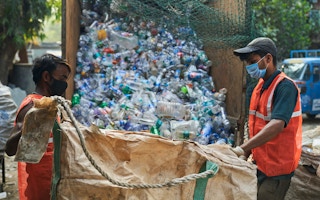The first round of talks on the terms of a global treaty to end plastic pollution concluded last week. Representatives of the 150 United Nations member states will be hoping that the final agreement fulfils its promise of limiting the amount of plastic waste being produced, and of accelerating changes in how plastic is being used and reused.
To continue reading, subscribe to Eco‑Business.
There's something for everyone. We offer a range of subscription plans.
- Access our stories and receive our Insights Weekly newsletter with the free EB Member plan.
- Unlock unlimited access to our content and archive with EB Circle.
- Publish your content with EB Premium.
While the treaty must be flexible enough to consider local context, Asia is well-positioned to play a leading role due to several key factors. The region has a waste management and recycling industry that is ripe for disruption, and policy pathways for recycling innovation and investment are already in place. It also has a large workforce that can benefit from the growth of recycling and circular industries.
Asia’s emerging markets have long grappled with a plastic waste crisis due to inadequate infrastructure, the presence of major manufacturing hubs, and a legacy of waste importation. But it is also in Asia that we are seeing the green shoots of a new economy and the potential to build a next-generation model for plastic circularity. As a production and consumption powerhouse, Asia could lead the way and help the world sharpen the focus of policies for better management of plastic waste, as well as to create an enabling environment for greater circularity.
Indonesia and India, in particular, can provide good examples of how proactive national action plans can create an enabling policy environment that unlocks finance and encourages innovation in the private sector.
Both also share a dynamic entrepreneurial community that is supported by policy, and driven by immense creativity and purpose. Their start-up ecosystems and business environments are conducive to the fight against plastic pollution and waste.
Indonesia, which shoulders a disproportionate burden of plastic pollution, has made remarkable progress with its National Plastic Action Partnership (NPAP), an initiative which brings together leading policymakers, experts, businesses, entrepreneurs and civil society to work towards the goal of a 70 per cent reduction in marine plastic debris by 2025. Its roadmap has been regarded as one of the most ambitious plans to date to combat plastic pollution and waste.
Indonesia alone estimates that it will require around US$18 billion in capital investments between 2017 and 2040 and US$1 billion a year increase in operational financing for solid waste management (SWM) systems to meet the 70 per cent waste reduction target.
Lessons can be taken from Indonesia’s approach to mobilising private and public capital for sustainable development, as well as from how the government has been proactively helping to foster solutions, for example by driving the development of domestic capital markets through thematic bond issuances and loans. In 2018, the Indonesian government launched the world’s first green sukuk (Islamic) bond with a US$1.25 billion issuance. Similar green and sustainable development goals (SDG)-aligned bonds were subsequently introduced to raise capital for infrastructure, including for waste management solutions.
Likewise, India has introduced supportive regulatory frameworks such as the Extended Producer Responsibility (EPR) scheme, which created a compliance-based market opportunity that helped to catalyse US$26 million from domestic and international investors for Recykal – India’s first waste-commerce platform – in just three years. In tune with the global awakening to the investment opportunities in the plastics circular economy, Recykal recently raised an additional US$22 million from multinational investment firm Morgan Stanley and existing investors.
Another example of multi-stakeholder action and consultation, the India Plastic Pact, a joint initiative between WWF India and Confederation of Indian Industry (CII), addresses the barriers to circularity in the plastic packaging sector, with a goal of making 100 per cent of plastic packaging reusable, recyclable or compostable by 2030.
Bringing dignity to informal workers
Asia can also demonstrate how the creation of policy to implement the terms of a legally binding instrument can be used to uplift the millions of informal sector workers, who play a crucial role in the waste management and recycling ecosystem in many emerging economies.
In a recent study of nine Asian cities, the contribution of informal waste workers accounted for over 95 per cent of polyethylene terephthalate (PET) recovered for recycling. In India, CII Foundation is working across community and government sectors to ensure fair and ethical treatments of these essential workers.
With global brands setting targets to increase recycled plastic content in their packaging, we should also see an increase in the demand for recycled plastic, and with greater investment flowing into the sector, there is an opportunity to create sustainable, inclusive supply chains that ensure these workers are properly recognised and compensated.
If the global plastics treaty is ambitious enough, it is possible that we can transform our take-make-waste linear economy into a thriving, self-sustaining and inclusive circular economy for plastics within our lifetimes.
Asian countries like India and Indonesia are demonstrating that a systems challenge like plastic pollution requires systems solutions from a wide variety of actors.
With smart policy, a dynamic entrepreneurial community, and a genuine desire to bring about sustainable change, they have boldly embraced circular value chains, demonstrating their value and providing a powerful blueprint to other markets.
Ellen Martin is the director of impact and insights at non-profit The Circulate Initiative.









